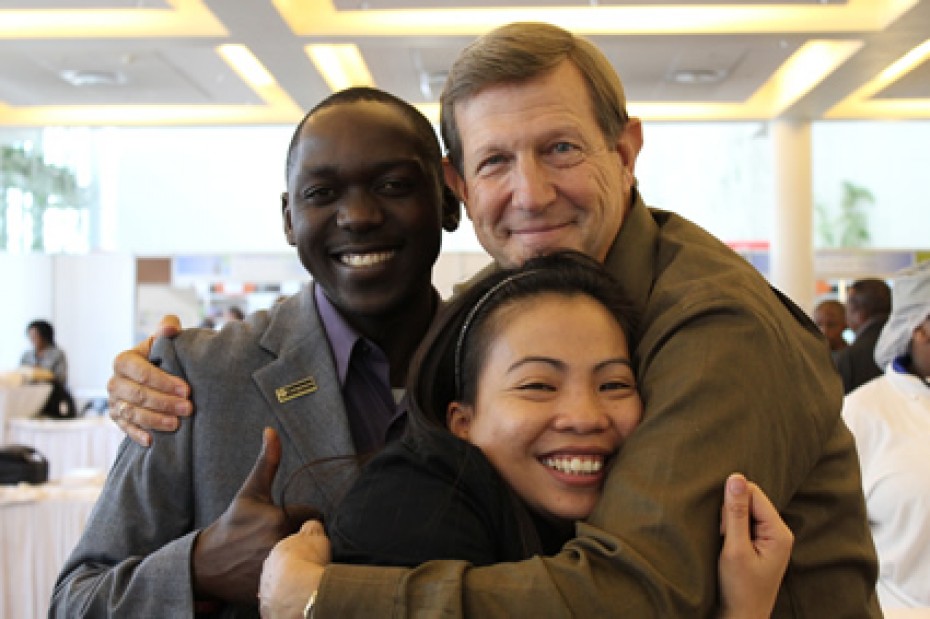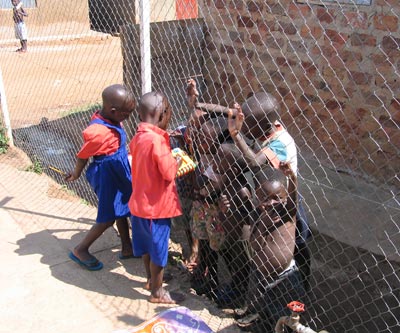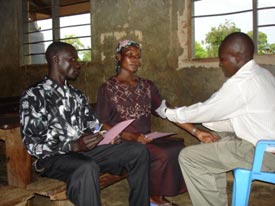Letter Writing Ideas From the Moody Bible Institute Scholars

Four Leadership Development Program graduates now attending Moody Bible Institute share some tips on what you should include in the letters you write to your sponsored children.
Continue Reading ›What’s It Like Growing Up in Poverty?
Another clip from our video interview with the Moody Bible Institute scholars.
After watching it, will you sponsor a Leadership Development Program student? You can do so by yourself, but you can also do it as a group, with family, friends, co-workers, your small group, etc.
Who’s in Charge?
So, an emperor, a chief and a queen are all in a room together. The emperor is from Uganda. The chief is from the Dominican Republic. And the queen is from the Philippines. Who’s in charge?
Bringing Joy: My Best Day in Ministry
Kenneth Kataryeba, a learning and support specialist for East Africa, shares the story of a girl in a wheelchair whom he just met, and how bringing joy to children and helping lift them from the misery of poverty is how he really gets paid.
God’s Agents of Change: Unscripted
In late July we interviewed our Moody Bible Institute scholarship recipients using questions you submitted here. We filmed the interview and will be sharing clips from the session with you over the next few weeks.
In the first clip, which is just over 13 minutes long, you’ll get to see how Richmond, Tony, Michelle and Jimmy interact with one another.
You’ll get a taste of the strength of their relationships with one another and with God.
And you’ll get a little insight into what Jimmy probably asked his sponsor when they met at Catalyst 2009.
Beyond getting to know them a little better, by learning what these agents of change are studying at Moody and why they chose their fields of study, you’ll also hear, among other things:
- Tony speak about his call to serve teenagers
- Michelle and Richmond share about their desires to develop strong Christian leaders in the Philippines and Uganda
- Jimmy relate what life was like before he was sponsored
Enjoy.
My Best Day in Ministry: Compassion Over the Past 10 Years
Jacob Kitonsa began working for Compassion in Uganda in 1999. He currently works in our International Program Group as a Senior Leadership Development Program Specialist.
Richmond Wandera: My Best Day in Ministry
Moody Bible Institute scholar Richmond Wandera shares how the telling of his story and one woman’s response to it reminded him that child sponsorship is a part of God’s work.
A Typical School Day for Brenda
In Uganda, the name “Makerere” is synonymous with Uganda’s oldest and most prestigious institute of higher learning: Makerere University. The university sits on Makerere Hill and is not only revered for its students’ academic proficiency and health education, but also for the spacious, manicured lawns and modern buildings that constitute this seat of learning.
In the slum community of Makerere Kivulu that lies in the shadow of this prominent institute, the storm drains overflow with filth and stinking water between rows of shacks made of planks and rusty iron sheets. The dilapidation of these structures is set off by the stable buildings surrounded by high stone walls that dot the area.
Many of the people in the community are unemployed, and even those who are employed are underemployed, dealing in small businesses like hawking goods, frying and roasting food like cassava, and selling vegetables like tomatoes and eggplants.
Most of them earn a maximum of about a dollar a day. In despair, many of the women look to prostitution to earn a living, and the men resort to alcohol and spend their days drunk. The youth form gangs and go about stealing and indulging in drugs.
It is this community that 13-year-old Brenda wakes up to every morning at 6 a.m. (more…)
From the Outside Looking In
Back in May I published a photo and asked you to give it a caption. I also included a little context from the photographer.
“Along the wall outside the Compassion project, many children watched and waited while the other children played and sang. With hundreds and thousands of children needing the hope that Compassion brings, our hearts broke to see the ones that could not be helped. Hundreds more are waiting for their chance to be sponsored, to be given hope, to be shown the love of Christ.” — scfish7
Then recently, I received the following e-mail.
“I read the blog about the children who are registered who are able to sing and enjoy meals while the unregistered ones just stare at them, wishing they were one of them. I have a hard time imagining what this is like.
“Is it like there is a ‘Century Fence,’ so to speak, that separates these two groups, where the unregistered look in and feel sad as they watch the sponsored eat hot meals and be carefree?
“Does this make them feel more unloved?
“Is it appropriate to send a picture or have one on this Web site so I can see what you are talking about? I have a hard time understanding this and maybe a picture would help.”
What are your thoughts? What do the children on the outside looking in feel?

HIV and AIDS in Uganda
Uganda is often held up as a model for Africa in the fight against HIV and AIDS. Strong government leadership, broad-based partnerships and effective public education campaigns all contributed to a decline in the number of people living with HIV and AIDS in the 1990s.
Despite this impressive reduction in the spread of AIDS in Uganda (from 30 percent in the 1980s to 6.5 percent to date), AIDS is still infecting and killing many Ugandans. Uganda’s HIV prevalence rate has stagnated over the past four years, meaning that the country is not managing to reduce the number of new HIV infections.
Damalie Andabati, the health specialist in our Uganda Country Office, says,
“Currently 6.3 percent of Uganda’s population is infected with HIV, and a new issue that has been discovered by the Uganda Virus Research Institute is that 66 percent of the new infections are among married couples.”
The reason for the high percentage in this unexpected group is not yet certain.
It is feared that HIV prevalence in Uganda may be rising again. It has been suggested that antiretroviral drugs have changed the perception of AIDS from a death sentence to a treatable disease. This perception may have reduced the fear surrounding HIV.
 As part of our holistic outcomes around health, voluntary counseling and testing (VCT) for HIV is part of the regular health screenings conducted for the parents and children at the child development centers.
As part of our holistic outcomes around health, voluntary counseling and testing (VCT) for HIV is part of the regular health screenings conducted for the parents and children at the child development centers.
Kansanga Child Development Center carried out a VCT session back in March and 233 caregivers and children were tested, which is one of the best success stories of beneficiaries being tested for HIV by Compassion Uganda.
Kansanga, a red-light district of Kampala, is a community in the slum areas, and the child development center is located one kilometer away. Much effort has been put in clearing this district of prostitution and raising awareness about preventing HIV. Many fear being seen going for the test or seeing the results they will receive from the test.
More than 60 percent of Uganda’s population is illiterate and ignorant, and others are even too poor to own radios from which they would hear information on where to go for testing. Our church partner staff, and government officials, are hopeful for the future — that with tireless effort in community training and sensitization this figure will be adjusted.
Help support Compassion’s AIDS Initiative today.
What Is Your Passion in Life?
What fuels the passions burning inside of each of us? Mine stir up when I see images or hear stories of children in East Africa.
Four years ago, a life-changing documentary ignited a fire in my heart that’s been gathering fuel ever since. This “Invisible Children” documentary follows the journey of child soldiers in northern Uganda, an area where we have child development centers close by.
I sponsor a beautiful child in Uganda named Emmanuel, and children Emmanuel’s age are vulnerable. Partnering with nonprofits like Compassion and Invisible Children, I try to use every sphere of influence I have to tell the story of the children in Uganda. The children who are pulled from their beds at night to join the rebel army. The children who are forced to shoot their parents and family members in order to survive. The children who are forced to fight a war older than they are.
But I – we – must do more than watch a documentary or read an article and think about it. My best friend says, “Words without actions mean nothing.”
So I ask you: What is your passion in life? And how can you fan the flames of that passion?
My guess is that if you’re reading this, you’re passionate about children … or poverty, which is why we love you. And that’s why you’re making a difference in the lives of little ones around the world, including ones in Uganda.
But I wonder: Can you take it a step further?
Maybe as you’re reading this, you’re thinking … “I need to . . . .”
What exactly is it that you’re thinking? 🙂
Don’t hesitate. Do it!
Jesus is remembered for extravagant love. What do you want people to remember you by?
If I were to die tomorrow, I would want everyone to remember that I loved Africa deeply. That my heart burned for a land so far away, yet so close that it haunted my dreams and stirred in me something I never dreamed possible. That I fell deeply in love with a group of children who were forced to kill in a rebel army.
And mostly, I would want people to keep fighting so that someday, those children will be free – and the children we serve at Compassion are released from poverty.
During my recent trip to East Africa, a leadership development student said to me, “We hear your prayers and we want you to know … we are not asleep. We are awake.”
He reminded me that through your support, more than 1 million children across the world have come alive and been released from poverty. How will you and your passion come alive today?
A Conversation With Richmond Wandera
Do you remember Richmond? He’s one of the Wess Stafford-Moody Bible Institute Scholarship recipients Celina told you about.
Do you have 21 minutes? If so, you’ll be hard-pressed not to be impressed by this humble man.
Greg Nettle, senior pastor of Rivertree Christian Church, conducts the interview.



